You are using an out of date browser. It may not display this or other websites correctly.
You should upgrade or use an alternative browser.
You should upgrade or use an alternative browser.
The Politics of Climate Change: Green New Deal And Other Madness
- Thread starter Ennio
- Start date
We live in a planet of crazy monkeys.
Here a very interesting article by F. William Engdahl where he show us all the bandits billionaires that are in this green deal. That gives nausea. From the most important bankers to our cherished Mister Gore to Lagarde, to banks of any country, etc... And how they will invest our money to make money for them. Just for them, not for us. Because for us it will be Ice age.
So I think this is a good article that gives a real vision of what is behind this crazy thing named Climate Change.
Follow the “Real Money” Behind the “New Green Agenda”
Here a very interesting article by F. William Engdahl where he show us all the bandits billionaires that are in this green deal. That gives nausea. From the most important bankers to our cherished Mister Gore to Lagarde, to banks of any country, etc... And how they will invest our money to make money for them. Just for them, not for us. Because for us it will be Ice age.
So I think this is a good article that gives a real vision of what is behind this crazy thing named Climate Change.
Follow the “Real Money” Behind the “New Green Agenda”
bjorb
The Living Force
Politicians and the media love Greta while the public loathes her? Is Greta's ''popularity'' a facade? Perhaps, her name took a nosedive in popularity among newborns.
No 'Greta Effect': Thunberg's Name Slumps in Popularity Among Newborns
The media's almost undivided attention to the celebrated teenage climate activist and her environmentalist cause hasn't spawned many of Greta Thunberg's namesakes in her home country. By contrast, the popularity of her name hit its lowest point in a decade.
Greta Thunberg's huge media success has not resulted in a boom in the name statistics, the newspaper Göteborgs-Posten reports.
Furthermore, the name Greta fell outside of the top 1,000, as number of newborn girls named Greta dropped from 149 in 2018 to 104 in 2019.
The last time the name Greta enjoyed a period of relative popularity was in 2015, before Thunberg's rise to fame, when 192 Gretas were born, nearly double as many as now. Today, despite the Swedish and international media covering Greta Thunberg's every step and her name making headlines almost daily, the name is down to its lowest point in ten years.
Alice and Lucas were the most popular names given to newborns in 2019. Both names have been popular for several previous years and have topped the list of the most common names several times before. Other popular girls' names include Olivia, Astrid, Maja and Vera, while Liam, William, Elias and Noah prevailed on the boys' side, Statistics Sweden reported.
In recent years, millions of people have followed 17-year-old Greta Thunberg, who became the focal point of the School Strike movement, inspiring and participating in numerous demonstrations across the globe. In 2019, she famously crossed the Atlantic in a “zero-emissions” yacht to make a statement and went viral after attacking global leaders and accusing them of “stealing her dreams and her childhood”.
Thunberg also amassed a plethora of awards, and was named Person of the Year by Time magazine. She was even tipped as a likely winner of the Nobel Peace Prize, but narrowly missed it. Recently, she was nominated again by Swedish Left Party MPs.
Since then, the spike in the number of children engaging in online activism has soared, coining the term "Greta Effect".
Do humans have to go extinct to save the climate?
Climate craziness doesn't seem to know any bounds anymore.
Late last year we heard from a Swedish professor demanding that humans should start to eat human flesh to save the climate. Magnus Söderlund dismissed taboos against cannibalism as "conservative."
Magnus Söderlund dismissed taboos against cannibalism as "conservative."
Now Patricia MacCormack, who works at Anglia Ruskin University in the UK as a professor of continental philosophy and who is also a proselyting vegan, made a radical suggestion in her new book “The Ahuman Manifesto.”:
Humans must “phase out reproduction” and themselves extinct in order to defeat global warming and climate change.
According to Anglia Ruskin University's website she “has published extensively in the areas of Continental philosophy, feminism, queer theory, posthuman ethics, animal studies and horror films.”
“Mankind is already enslaved to the point of ‘zombiedom’ by capitalism, and because of the damage this has caused, phasing out reproduction is the only way to repair the damage done to the world,”
according to a Cambridgeshire Live article summarizing the professor’s work.
While on the subject of zombiedom...

Swedish Professor Sigrid Agenäs: Consider Goats Instead of Cats as Pets to Fight Climate Change
A Swedish agricultural studies professor has joined the growing chorus of academics scolding pet owners about their four-legged friends' carbon pawprints. Cats and dogs eat meat, which produces significant emissions, and therefore should be replaced with herbivorous pets when possible.
writes Helen Buyniski on rt.com
Sigrid Agenäs recommends pets that eat only plants, saying, “If you want to eat vegan or vegetarian for ethical or environmental reasons, it is better to choose herbivorous animals such as aquarium fish, rabbits, chickens or goats than carnivorous pets.”
Meanwhile, the Swedish public has voted that climate change spending has been the biggest waste of taxpayer money in 2019, according to a poll by the Swedish Taxpayers’ Association.
The Taxpayers’ Association released the results of their annual wasteful spending poll earlier this week, declaring that climate policy had been the biggest waste of money, largely due to the fact that despite the spending, emissions in Sweden had actually slightly increased.
Article by Breitbart
Climate craziness doesn't seem to know any bounds anymore.
Late last year we heard from a Swedish professor demanding that humans should start to eat human flesh to save the climate.
 Magnus Söderlund dismissed taboos against cannibalism as "conservative."
Magnus Söderlund dismissed taboos against cannibalism as "conservative."Now Patricia MacCormack, who works at Anglia Ruskin University in the UK as a professor of continental philosophy and who is also a proselyting vegan, made a radical suggestion in her new book “The Ahuman Manifesto.”:
Humans must “phase out reproduction” and themselves extinct in order to defeat global warming and climate change.

According to Anglia Ruskin University's website she “has published extensively in the areas of Continental philosophy, feminism, queer theory, posthuman ethics, animal studies and horror films.”
“Mankind is already enslaved to the point of ‘zombiedom’ by capitalism, and because of the damage this has caused, phasing out reproduction is the only way to repair the damage done to the world,”
according to a Cambridgeshire Live article summarizing the professor’s work.
While on the subject of zombiedom...

Swedish Professor Sigrid Agenäs: Consider Goats Instead of Cats as Pets to Fight Climate Change
A Swedish agricultural studies professor has joined the growing chorus of academics scolding pet owners about their four-legged friends' carbon pawprints. Cats and dogs eat meat, which produces significant emissions, and therefore should be replaced with herbivorous pets when possible.
Why are the climate militia setting their sights on pets? Birth rates are plummeting in Europe and the US, where record low fertility has long since dipped past the rate needed for the population to replace itself. While this trend was underway long before the climate brigade came along demanding women put off childbearing to save the planet, enough celebrities have taken up that line of argument that they can claim it as a victory and move on to people's four-legged children.
But if pets are one of the last things standing between an increasingly large slice of humanity and utter alienation – and if, as medical experts are saying, loneliness is truly worse than obesity in predicting future health problems – those who would replace our cats with goats are asking us to make a very difficult choice.
As we get used to the lonely green future without our furry friends, we can take comfort in the fact that we've kept planet-wide warming to a manageable level, though, right? Not quite – the carbon footprint of the world's domesticated cats and dogs pales in comparison to that of the US military, for example, which produces more emissions than most countries. Why, with elephants like this in the room, is the environmental movement setting its sights on dogs and cats? Aren't we already lonely enough?
writes Helen Buyniski on rt.com
Sigrid Agenäs recommends pets that eat only plants, saying, “If you want to eat vegan or vegetarian for ethical or environmental reasons, it is better to choose herbivorous animals such as aquarium fish, rabbits, chickens or goats than carnivorous pets.”
Meanwhile, the Swedish public has voted that climate change spending has been the biggest waste of taxpayer money in 2019, according to a poll by the Swedish Taxpayers’ Association.
The Taxpayers’ Association released the results of their annual wasteful spending poll earlier this week, declaring that climate policy had been the biggest waste of money, largely due to the fact that despite the spending, emissions in Sweden had actually slightly increased.
Article by Breitbart
bjorb
The Living Force
Humans must “phase out reproduction” and themselves extinct in order to defeat global warming and climate change.
Perhaps changing the climate-cult into a suicide-cult will do the trick. Just a friendly suggestion ...
These people are dangerous fanatics and are capable of anything giving the power to do so. They will destroy the world in order to ''save'' it.
Some have been following Randall Carlson's work concerning our earths historical landscape and the changes that she has experienced - comet impacts or explosions et cetera. Most of what I've seen with Carlson, unless subtlety, does not get into this modern day AGW climate people delusion (and can understand why), however there have been sites, such as skeptical science (https)://skepticalscience (dot)com/argument.php?a=16&p=7('Getting skeptical about global warming skepticism' is their raisons d'etre) with their many acolytes in posts who like to flex their IPCC muscles to tell it as it is. Now one poor guy deviated on their site to suggest what they were saying was not the whole banana, he (dkoli) brought up Carlson and was quickly put down for doing so. dkoli was obviously in the wrong bar, which he realized, as his comments were struck through as seen below:
Yes, it happens here also, yet comments are not struck through while being in a wrong bar is often a reminder ( ).
).
So, prior to this (October 16, 2015 - had not read it then), Carlson gets into a debate in an article based on his Facebook page to air out the climate laudry in the light, and good for him.
This article by Carlson is a point/counter point on questions, and Carlson points that there is no 'denial' that humans have had impact on climate on some levels (because he is called a denier), yet by what degree and mechanism... Compared to the spikes in time that is.
It starts like this (just a snip here as it is a large article):
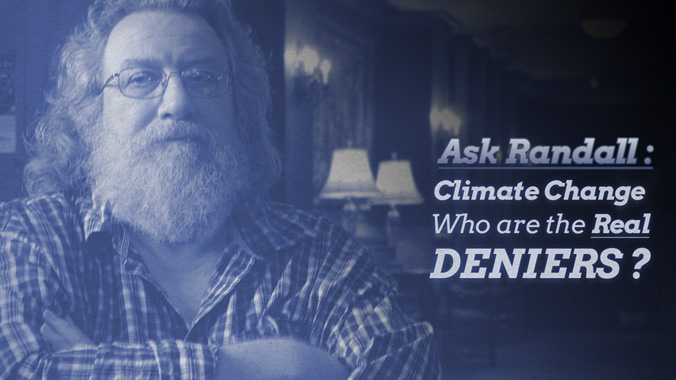
 sacredgeometryinternational.com
sacredgeometryinternational.com
What is clear of the people who have tried to have a rational debate, and they have tried, extending invitations around the world, is just not allowed. No, instead, and as Carlson states, they keep repeating their 'weasel' words and now have resorted to rolling out climate mascots such as the minor Greta to help guilt and rally the cause, which is then being backed up by the Davos boys, such as the banker Carney to get all the corporate dependencies in line through economic bully tactics. Guys like him remind them that they will be crushed if they don't tow the line.
Oh, so no loans, right?
Right, unless you do and build as we say!
Well, that is a big stick to wield over peoples heads, so what can be done to counter when their end game was never about climate, that, osit, is just their camouflaged fuel being used for their vehicle's power and control. The power to reduce; people, communities, countries, inalienable rights and to skim off their wealth in the process, to soften it all up...
Session 18 January 2003
A: The situation looks bleak indeed. But remember the Achilles heel of STS: Wishful Thinking.
Well he seems open minded to me. Between his work and that seen on Adapt 2030 it seems to me like the grand solar min, the dalton min, the magnetosphere and the galactic cross correlate with the earths climate far better than an tiny increase in a trace gas. But if me being open minded to that hypothesis makes me a closed minded shill perhaps this isn't the site for me. The comments seem very one sided. I don't feel this is the place for a truly unbiased debate.
Yes, it happens here also, yet comments are not struck through while being in a wrong bar is often a reminder (
 ).
).So, prior to this (October 16, 2015 - had not read it then), Carlson gets into a debate in an article based on his Facebook page to air out the climate laudry in the light, and good for him.
This article by Carlson is a point/counter point on questions, and Carlson points that there is no 'denial' that humans have had impact on climate on some levels (because he is called a denier), yet by what degree and mechanism... Compared to the spikes in time that is.
It starts like this (just a snip here as it is a large article):
Editors note:
The following is Randall Carlson’s definitive response to an affected attempt to label him as a “climate change denier.” Randall is of course more than happy to debate anyone from the pro IPCC global warming alarmist camp, brave enough to engage him in an open forum. Truly the debate is not over… but just beginning. Interested climate scientists or other related experts are welcome to contact us via our contact page and please use “Climate Change Debate” in the subject line.

Ask Randall: Climate Change - Who Are The Real Deniers?
It is too bad that the term “denial” has become such a weasel word, invoked whenever a global warming proponent attempts to avoid any real debate. But what does this name calling say about the intellectual integrity these modern pharisees?
What is clear of the people who have tried to have a rational debate, and they have tried, extending invitations around the world, is just not allowed. No, instead, and as Carlson states, they keep repeating their 'weasel' words and now have resorted to rolling out climate mascots such as the minor Greta to help guilt and rally the cause, which is then being backed up by the Davos boys, such as the banker Carney to get all the corporate dependencies in line through economic bully tactics. Guys like him remind them that they will be crushed if they don't tow the line.
Oh, so no loans, right?
Right, unless you do and build as we say!
Well, that is a big stick to wield over peoples heads, so what can be done to counter when their end game was never about climate, that, osit, is just their camouflaged fuel being used for their vehicle's power and control. The power to reduce; people, communities, countries, inalienable rights and to skim off their wealth in the process, to soften it all up...
Session 18 January 2003
A: The situation looks bleak indeed. But remember the Achilles heel of STS: Wishful Thinking.
angelburst29
The Living Force
Politicians and the media love Greta while the public loathes her? Is Greta's ''popularity'' a facade? Perhaps, her name took a nosedive in popularity among newborns.
This should spice things up - a bit? Bezos must have a lot of potential investments riding on "climate change", enough to put a little more capital behind it, to give his investments a boost, while appearing to be "a big donor"?
Amazon founder Jeff Bezos launches US$10 billion fund to combat climate change
Amazon founder Jeff Bezos launches US$10 billion fund to combat climate change

Amazon chief executive Jeff Bezos
Feb. 17, 2020 - WASHINGTON (AFP) - Jeff Bezos, founder and CEO of Amazon and the world's richest man, said Monday (Feb 17) he was committing US$10 billion (S$13.9 billion) to a new fund to tackle climate change.
In a post to his 1.4 million followers on Instagram, the e-commerce tycoon said the Bezos Earth Fund would "fund scientists, activists, NGOs - any effort that offers a real possibility to help preserve and protect the natural world."
"Climate change is the biggest threat to our planet," said Bezos, whose net worth is estimated to be around US$130 billion.
"I want to work alongside others both to amplify known ways and to explore new ways of fighting the devastating impact of climate change on this planet we all share."
Bezos, who maintained his status as the world's richest person despite an expensive divorce last year, said his new foundation would begin issuing grants this summer. Rather than make investments which the business guru might profit from, the fund will allocate grant money to projects, the New York Times said, quoting unnamed sources familiar with the initiative.
bjorb
The Living Force
Stuck in ice while saying it's all melting 
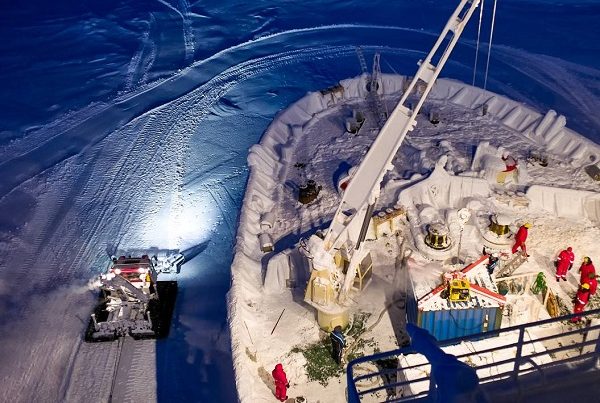
 electroverse.net
electroverse.net

Yet another Icebreaker finds itself Stuck in Unexpectedly Thick Arctic Ice - Electroverse
An icebreaker, on her way to support the MOSAiC expedition, is stuck in thick Arctic sea ice, and, as a result, a third icebreaker has now been sent out.
Ah, the climate meltdown continues with youth - "Call it climate anxiety, eco-anxiety, climate grief, but what it seems to be is a sense of helplessness"
Yet not to worry, there are solutions if one can only answer the call to action and seek out climate grief counseling.

 vancouversun.com
vancouversun.com
Yet not to worry, there are solutions if one can only answer the call to action and seek out climate grief counseling.

From climate grief to climate action: Young people need hope, concrete goals
Call it climate anxiety, eco-anxiety, climate grief, but what it seems to be is a sense of helplessness
From climate grief to climate action: Young people need hope, concrete goals
Call it climate anxiety, eco-anxiety, climate grief, but what it seems to be is a sense of helplessness
Randy Shore
Updated: March 7, 2020

Like many young people, Kaiya Jacob feels the weight of climate change and its consequences very keenly. Francis Georgian / PNG
The Earth is a ticking time bomb with a 10-year fuse.
Whether you believe that or not, many young people are already in mourning for a world they believe will perish in their lifetime. It’s called eco-anxiety, or climate grief.
“I think about wanting to have kids and not knowing if I will be able to bring new life into this crumbling world,” said SFU student Kaiya Jacob.
She is not alone. Activists say feelings of environmental despair are increasingly common among teens and young adults.
The climate change conversation has taken on a relentless urgency, complete with doomsday scenarios suggesting that the planet will reach a catastrophic tipping point by 2030 without dramatic reductions in greenhouse gas emissions.
The fight against global warming and climate change has given way to climate crisis, and most recently “climate emergency.”
“Call it climate anxiety, eco-anxiety, climate grief, but what it seems to be is a sense of helplessness,” said George Radner, the 24-year-old executive director of Be The Change Earth Alliance. “It’s very widespread. Young people understand climate change, they perceive it to be the crisis that it is, they perceive it as the world ending.”
Be The Change runs workshops for students using university-aged facilitators to help young people learn to express their fears and to turn their energy to solutions.
“We want to give students a sense of hope and agency when it comes to climate change,” he said. “Youth are paralyzed by their fear and have the sense that they are powerless to fix this massive issue caused by adults.”
The facilitators are just a few years older than the students and they share their own relatable stories about how they became involved in climate action. By the end of the session, the students are the stars of their own climate story with a call to action, something tangible they can do.
Radner does worry that the recent trend to treat climate action as an emergency is having “unintended negative consequences on youth.”
“I wish that youth could be receiving different messages than adults,” he said.
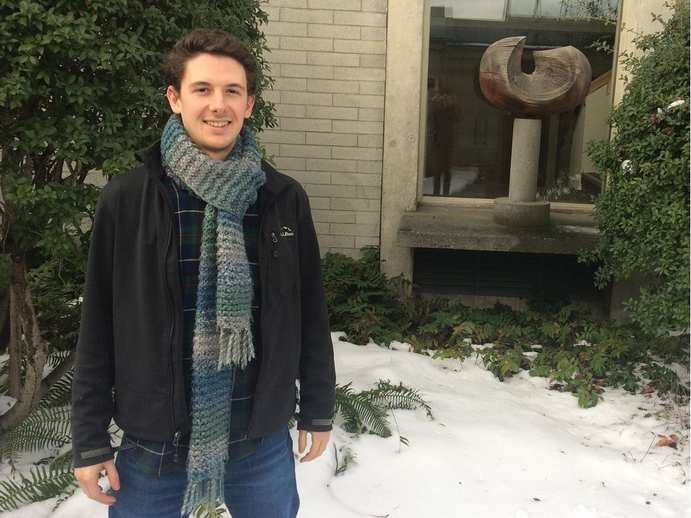
George Radner is the executive director of Be The Change Earth Alliance. handout / PNG
Dozens of governments, mainly in North America and Europe, have declared a “climate emergency” and Oxford Dictionary made the term its 2019 word of the year, in part due to a 10,700 per cent increase in its use.
“The adults of this world need a wake-up call and they need to hear that urgent tone,” said Radner. “I want media to tell the truth {}, fundamentally, but they should set a tone of crisis because we really haven’t woken up yet to climate change as a society.”
The Vancouver school board is hosting a Be The Change professional development workshop for 60 secondary school teachers, who often see firsthand how vulnerable teens are to despair in the face of climate emergency messaging.
Teachers will take part in “experiential processes” designed to explore their own “planetary grief.”
Be The Change has created resources tailored to the B.C. curriculum around themes of sustainability.
Teachers can apply those lessons in the classroom and with “students looking for opportunities to have hope and take action,” the board said.
The VSB sustainability plan notes that “evolving research indicates that presenting environmental ‘disasters’ to children at an improper age does not foster action — rather it can dissuade engagement with nature.”
“The Plan focuses on education and highlights that a connection to nature is an important part of sustainability,” the board said.
The district offers mental health resources to students in schools and through partners such as B.C. Children’s Kelty Mental Health Resource Centre.
A heavy burden
Kaiya Jacob can barely remember a time when she wasn’t concerned about the state of the planet.
“The burden of trying to fix the world is a constant in my life,” she said.
She feels the 2030 deadline for action acutely.
“I feel it very heavily, and just saying that I feel sweaty, like there’s a giant weight on my chest,” she said.
“When I talk to my friends it’s rare that climate doesn’t come up. I try to find moments of humour, so I don’t feel overwhelmed.”
Jacob is studying climate messaging in her communications studies at Simon Fraser University.
“Right now, the language is too crisis-oriented,” she said. “There’s not enough connection and shared caring for the environment. I’d like to see more messages about direct action, so we can start to solve these problems.”
Chest-tightening and the feeling of butterflies in the stomach, along with problems sleeping, are classic manifestations of anxiety, said psychologist Christine Korol, director of the Vancouver Anxiety Centre and an adjunct professor at the University of British Columbia.
While children experience anxiety much as adults do, they may lack coping skills to manage their feelings.
“As people get older they’ve seen more things and they know that predictions of doom aren’t new,” she said.
In the past 40 years, the threat of global nuclear annihilation, acid rain and the hole in the Earth’s ozone layer were all punctuated by end-of-the-world scenarios.
“Having seen doomsday predictions come and go, (older adults) are better able to take a wait-and-see attitude and they trust that when something terrible does happen, we can cope with it,” she explained. “Young people don’t have that experience.”
If you have a teenager worried about climate change, as a parent you can ask specifically what they are worried about.
“Kids sometimes have misconceptions and they might be afraid of something they don’t need to be afraid of,” she said. “You can also help them to understand what their power is and how they can channel their energy into something constructive.”
Teen climate activist Greta Thunberg took her anxiety and did something constructive with it, promoting Fridays for Future school climate strikes, she said.
Indeed, Thunberg notes emphatically in her book that “No One is Too Small To Make a Difference.”
{her ghost written book 'Our House Is on Fire' is bound to be a smashing success in the mobilization efforts to take further action. However, at least in Germany, there is already a backlash - horrible:

and then there is the Anti-Greta:
Thought-police come for Koch-funded 'anti-Greta' - but unlike 'real Greta,' her conflicts of interest are in public view -- Sott.net}
“We all have different gifts, we all have different strengths and weaknesses, so it’s important to do what feels right to you,” said Korol. “That might mean going to a protest, or getting outside and doing environmental work.”
If you or your child are struggling with symptoms of anxiety, such as sleeplessness or obsessive behaviour, treatments are available to address fears and to develop coping strategies, she said.
{children and their parents may want to seek help from the official climate shrink, Margaret Klein Salamon}
While climate anxiety is not a medically recognized disorder {soon to be classified in the DSM-5 revision no doubt}, “climate change has been associated with numerous mental health conditions including post-traumatic stress disorder (PTSD), depression, anxiety, grief, substance use disorders, and suicidal ideation,” according to a recent article in the B.C. Medical Journal.
Dr. Elizabeth Wiley notes that catastrophic fire seasons, poor air quality due to wildfires, evacuations and water insecurity all have mental health implications for people directly affected by climate-related disasters.
The American Psychological Association notes that pondering the economic, political and environmental implications of climate change can fuel fatalism, resignation, fear and helplessness.
An APA special report notes that pursuing solutions such as cycling, using clean energy and adopting green spaces can curb stress and anxiety.
The complexity of climate science also has an impact on people’s ability to accept that change is coming and their ability to respond to that change.
“Information that increases perceptions of the reality of climate change may feel so frightening that it leads to denial and thus a reduction in concern and support for action {guilty as changed},” the report says of a recent study.
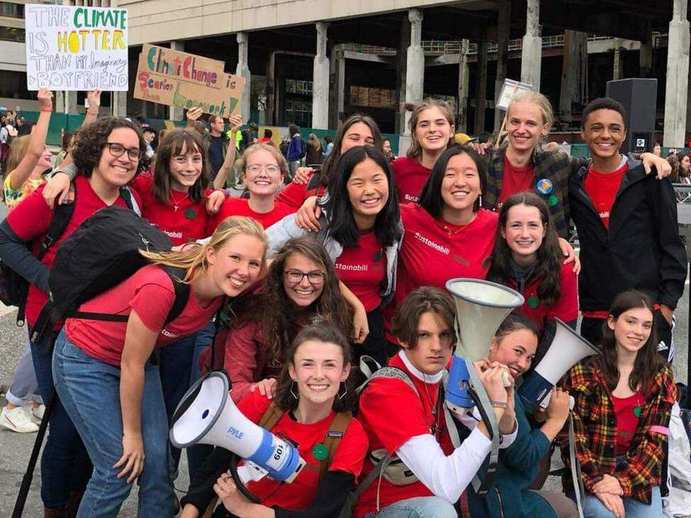
Sonja Schutte (lower left) and the Sustainabiliteens after the Climate Strike rally and march on September 27, 2019. PNG
Together we can
When people take action as part of a community, they are far more engaged and that is one of the reasons the Fridays for Future climate strikes have been so successful, argues Radner.
“People want joy and friendship and these movements can offer that,” he said. “Whether it’s a project in green energy or civil disobedience, when you do it in a group it makes a big impact.”
Climate strikes are also a way for young people to vent their frustration with the pace of change.
“I think Greta Thunberg is delivering hope, but with a different tone,” he said. “When she talks to the UN she’s very serious and grave. But the impact of her actions have really inspired a lot of young people and helped build real momentum in the youth global climate movement.”
Thinking about the consequences of climate change was taking a heavy emotional toll on Grade Ten student Sonja Schutte.
“I feel like the news is all bad,” she said. “Australia is on fire and everything you hear about that is really scary. We are teenagers having to fight one of the biggest crises Earth has ever seen.”
So, last year Schutte joined Sustainabiliteens and began organizing mass protests and student walkouts, including an October rally in Vancouver attended by Greta Thunberg.
“I’ve been worried about climate change all my life and I felt like it was time to do something,” she said.
Activism can be a double-edged sword, though.
“As you become more involved, you become more aware of how big the problem is,” she said. “But in Sustainabiliteens, I feel like I’ve found a community of people who help each other.”
rshore@postmedia.com
It may not have been noted on the forum (excuse me if duplicated), however Randall Carlson had a series on C02 back in 2017, so posting it here with this introductory snip on carbon cycles:
The is followed up with an essay on photosynthesis (snip):
REDEMPTION OF THE BEAST
The Carbon Cycle and the Demonization of CO2
by Randall W. Carlson (February 2017)
This essay and review of research into the carbon cycle and its effect upon the biosphere, more specifically upon the realm of plants and vegetation, is intended to provide a synopsis of evidence and information that is generally being neglected in mainstream discussions of Anthropogenic Global Warming (AGW) and to provide an enhanced and more realistic perspective on the effects of increasing concentrations of atmospheric carbon dioxide upon the world of nature and the world of society, which, of course, are inextricably linked.
The is followed up with an essay on photosynthesis (snip):
“Redemption of the Beast”
(part 2) The Miracle of Photosynthesis
A study of the effects of CO2 enrichment on trees in a controlled environment was published in 1985 and its findings were consistent with earlier experiments.

Word meanings, a little Corvid-19 backstopped by climate fanaticism, as Rex Murphy explains:

 nationalpost.com
nationalpost.com

Rex Murphy: Even in the midst of a health crisis, climate fanatics never miss an opportunity
Conway looks at this pandemic, which is poised to kill multitudes, and gloats about the right people being killed
Rex Murphy: Even in the midst of a health crisis, climate fanatics never miss an opportunity
March 13, 2020
3:12 PM EDT
Conway looks at this pandemic, which is poised to kill multitudes, and gloats about the right people being killed
Paramedics leave the Lynn Valley Care Centre, a seniors care home that housed a man who was the first in Canada to die after contracting novel coronavirus, in North Vancouver on March 9, 2020.Jennifer Gauthier/Reuters
It’s interesting, at least to me, to occasionally run through the history of a word — when it came to life and how its meaning changed over time. Words have life histories, they travel in meaning, some by such circuitous and serpentine routes that they end up their very opposite.
Any easy example is the word “nice,” which is now a term of approval, in many cases a compliment, as when we say of someone that “she is a very nice person.” In my personal view, to say someone is nice is a real tribute, as this is a time in which so many people, it appears, are not so nice. But when “nice” came out of the cradle, according to the complete Oxford English Dictionary (OED), with its 20-plus volumes and 500,000 or so entries, it was as an abrasive, dismissive and insulting epithet.
{It is a funny, cause I use that word often enough, and as Etymology has it:
nice (adj.)
late 13c., "foolish, ignorant, frivolous, senseless," from Old French nice (12c.) "careless, clumsy; weak; poor, needy; simple, stupid, silly, foolish," from Latin nescius "ignorant, unaware," literally "not-knowing," from ne- "not" (from PIE root *ne- "not") + stem of scire "to know" (see science). "The sense development has been extraordinary, even for an adj." [Weekley] -- from "timid, faint-hearted" (pre-1300); to "fussy, fastidious" (late 14c.); to "dainty, delicate" (c. 1400); to "precise, careful" (1500s, preserved in such terms as a nice distinction and nice and early); to "agreeable, delightful" (1769); to "kind, thoughtful" (1830).
In many examples from the 16th and 17th centuries it is difficult to say in what particular sense the writer intended it to be taken. [OED]}
By 1926, it was pronounced "too great a favorite with the ladies, who have charmed out of it all its individuality and converted it into a mere diffuser of vague and mild agreeableness." [Fowler]
"I am sure," cried Catherine, "I did not mean to say anything wrong; but it is a nice book, and why should I not call it so?" "Very true," said Henry, "and this is a very nice day, and we are taking a very nice walk; and you are two very nice young ladies. Oh! It is a very nice word indeed! It does for everything." [Jane Austen, "Northanger Abbey," 1803]
The first entry in the OED is as follows: “Foolish, stupid, senseless. Obs. (Common in 14th and 15th c.) Of persons.” Or, as we might say in the 21st century, “Of the panel members of ‘The View,’ or any ‘star’ commentator on MSNBC.” The word “nice” passed from that to take a more sybaritic turn, becoming a favoured adjective for fornication obsessives: “Wanton, loose-mannered; lascivious.” It then morphed into a common adjective for those who wore “flaunting, extravagant” clothing.
I won’t go through them all, but it is a semantic pleasure to see how a word slides through its various incarnations. On the other hand, some words are steely stable, never changing their core meaning over time. Take the word “fanatic.” The same authority, OED, tells us that in the 1500s, it meant, “Of an action or speech: such as might result from possession by a deity or demon; frantic, furious. Of a person: frenzied, mad.” In the 17th century, it had this connotation: “a visionary; an unreasoning enthusiast.”
“Unreasoning” is the key term here. A fanatic is someone who’s elevated a belief to a certitude — he doesn’t have an idea, an idea has him. One other definition hits this point: “characterized by excessive and mistaken enthusiasm.” One of the most quoted lines in 20th-century poetry warns of the political fanatic. W. B. Yeats wrote, ”the best lack all conviction/while the worst are full of a passionate intensity.”
Jumping to the more modern and relevant understanding, there is this, from “The Panorama of Life and Literature”: “The man of one idea, who works at nothing but that: sacrifices everything to that; the fanatic in short.”

An almost-empty Terminal 3 is seen at Pearson International Airport in Toronto on March 13, 2020. Frank Gunn/The Canadian Press
I was led on this little lexical romp by reading an article in the esteemed London Times. The headline was surely tantalizing: Coronavirus Can Trigger a New Industrial Revolution. I assumed it would be a kind of consolation piece, a hunt for a silver lining in this increasingly threatening time. It wasn’t.
The author, Ed Conway, got right at it in the first line: “Don’t take this the wrong way but if you were a young, hardline environmentalist looking for the ultimate weapon against climate change, you could hardly design anything better than coronavirus.” I had already guessed that someone, somewhere would somehow link global warming with this pandemic, but I never thought it would take such a grim turn.
The second paragraph is a real winner: “Unlike most other such diseases, it kills mostly the old who, let’s face it, are more likely to be climate skeptics. It spares the young. Most of all, it stymies the forces that have been generating greenhouse gases for decades. Deadly enough to terrify; containable enough that aggressive quarantine measures can prevent it from spreading. The rational response for any country determined to prevent loss of life is to follow China’s lead and lock down their economy to stem its spread.”
Conway is, based on the above definitions, clearly a fanatic. He’s possessed by an excessive and mistaken idea, one he subordinates to everything else, even a global pandemic. He sees the good side of all this. It will kill old people, but that’s a benefit because most of them (not all, mind you) are climate skeptics. It’s “deadly enough to terrify.” Terrifying people, or attempting to do so, is what warming fanatics have chosen as their primary tactic for two decades now. The idea being that the terror they instil will force countries to shut down the entire 21st-century economy.
So Conway, a Sky News editor, can look at this pandemic — which is poised to kill multitudes, disrupt entire nations and frighten the masses — and find in it not an occasion to weep and sympathize, but to gloat about the right people being killed. And he does so because it might serve his fanatical cause — the extinction of the modern economy and the end of all carbon emissions.
Some people are so right, they should be locked up. And yes, as Yeats proclaimed, the worst are full of a passionate intensity.
Word meanings, a little Corvid-19 backstopped by climate fanaticism, as Rex Murphy explains
I really enjoyed your post Voyageur. Rex Murphy's breaking down of Ed Conway's article for the London Times
was really eyeopening as to the FANATICAL thinking of Global Warming Alarmists. Cold, cruel and astonishing to see the mental landscape of these conditioned individuals. It really does provide a mirror to us all to examine where we might have some fanatical thinking. It stopped me in my tracks to do some deep examination.
In Session 22 July 2010 I made a post, which made me think about this thread. It began while reading Coronavirus epidemic in China: Apocalypse Now! Or exaggerated scare story? where Laura quoted parts of Session 22 July 2010
In Shutdown of thermohaline circulation - Wikipedia they say thatQ: (L) Okay, so what's going to happen? Is the Gulf Stream breaking up, and is that going to bring on an ice age?
A: It is, it will.
Q: (L) Is that like imminent?
A: The cause is more than the oil. But the people will only see the oil reason and turn against the elite for bringing on such a disaster. Also note that the nonlinear effects will take some time to develop fully.
Q: (L) Okay, so are you saying that there are going to be some people who are very aware sooner than others, and then it's going to spread?
A: Yes.
Would The Extinction Rebellion, Climate Emergency, Fridays for Future etc who organized protests in many countries across the world include people who had some awareness, but who perhaps were mislead? Did I misunderstand what they were really asking for? And if that is the case, what might I say next time I am confronted with the Global Warming scam, if that will even happen in a post Corona lockdown world?A shutdown or slowdown of the thermohaline circulation is a hypothesized effect of global warming on a major ocean circulation.
A 2015 study suggested that the Atlantic meridional overturning circulation (AMOC) has weakened by 15-20% in 200 years.[1]
anka
The Living Force
It looks like the COVID-1984 plannedemic is starting to backfire on another front:
Inconvenient Truth: Diesel Car Pollution Grossly Overhyped By German Activists
NoTricksZone, April 15
Roland Tichy’s site here reports that although car traffic in the German city of Stuttgart has decreased significantly due to COVID-19, the drop in NO2 content has only been “slight”.
So it cannot be the evil diesel engine cars that are “choking” our cities.

“The Corona crisis is bringing it to light: car traffic has decreased significantly, but the air quality in city centers has hardly changed,” Tichy comments.
Environmental claim exposed as false
Recall that a major reduction of diesel engines was supposed to improve air quality. After all, experts at the Baden-Württemberg State Institute for the Environment (LUBW), for example, have attributed a large 80 percent share of air pollutants especially to diesel vehicles – so they have to be banned soon. Yet Tichy notes: “If this is true, the ‘shutdown’ would have to have a drastic effect. But it does not.”
It turns out that the involuntary “corona experiment” with its widespread stop of car traffic has exposed bare the false claim made by environmental activists: Diesel cars are responsible for polluting the air of German cities.
Diesel car bans “pointless”
According to Tichy, the “Corona Experiment” exposes just how pointless driving bans issued by the green transport ministers can be. “They obviously have no effect on the NO2 concentrations in the air. The measured values, for example, at the Am Neckartor station in the Stuttgart city center were already below the limit value of 40 µg/m3 in February and March, ” writes Tichy. “At that time, traffic was still flowing and ‘shutdown’ had not yet been announced.”
Other larger factors
Tichy adds that engineer and measurement expert Martin Schraag accuses proponents of car bans of data “manipulation” and reminds that today’s “newer vehicles and those retrofitted with software updates hardly emit any exhaust gases. This should also have been reflected in the results.”
Schraag notes that NO2 values fluctuate strongly and depend heavily on Stuttgart’s weather conditions and wintertime heating can be the cause. “The weather, if you look at the data, has a decisive influence,” Tichy comments. “The experts of the LUBW environment office obviously did not care about these influences and officially know nothing about them. They still assume that traffic accounts for 80 percent of air pollutants.”
At a loss for words
Now they are facing difficulties in explaining the situation. As Schraag suspects, the 80 percent figure cannot be correct if there are significantly fewer cars on the road and yet the values have not changed.
The Bavarian State Office for the Environment also confirmed that the air pollutants in the city of Würzburg had hardly changed either although traffic has decreased significantly.
Renewable Energy - It has been a green theme from windmills to solar on this and other threads, and low and behold Michael Moore comes out with a new film, although it is going against renewables (even The Guardian is apparently getting in line):
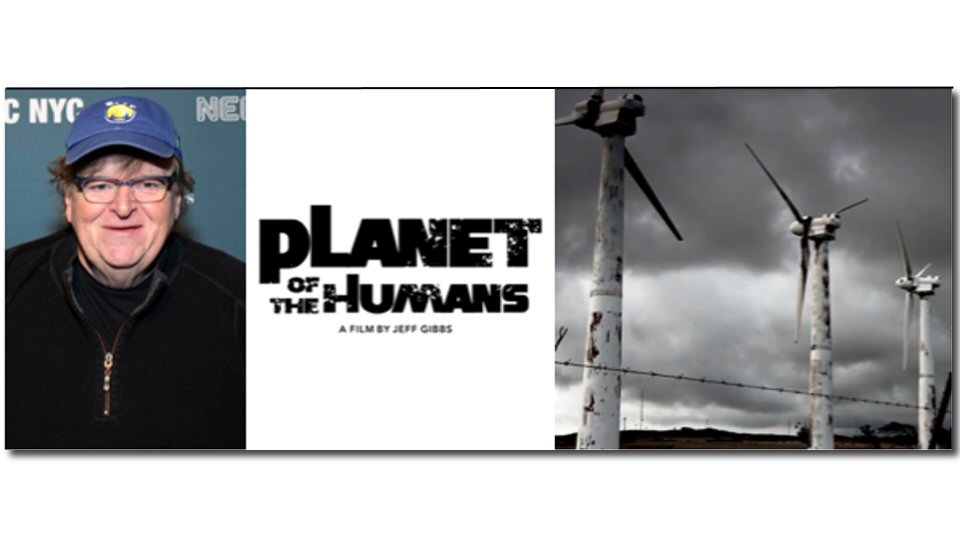
 wattsupwiththat.com
As Eric Worrall summarizes:
wattsupwiththat.com
As Eric Worrall summarizes:
There is a second article with the actual film, which has yet to be viewed, however there are a few points from Anthony Watts (with a dash of satire):
Forbes Michael Shellenberger's said:
Going back to Worrall:
"Or are they just softening us up, because they are about to spring something even worse on us?"

The End of Big Green? The Guardian Praises Michael Moore’s Anti Renewables Flick “Planet of the Humans”
Guest essay by Eric Worrall The Guardian even mentions nuclear energy in a vaguely positive light (unlike the Moore film). Planet of the Humans review – contrarian eco-doc from the Michael Moore st…
 wattsupwiththat.com
wattsupwiththat.com
What is happening to the Guardian? The other day they praised seafront property development, now they’re praising a movie which trashes renewables.
Have greens secretly hated renewables all along, and suddenly feel able to talk about it? Or are they just softening us up, because they are about to spring something even worse on us?
There is a second article with the actual film, which has yet to be viewed, however there are a few points from Anthony Watts (with a dash of satire):
A MUST READ! Wow, the renewable light bulb of “great idea” over Michael Moore’s head just burned out. He’s trashing renewables in this new film Planet of the Humans.
On the 50th anniversary of EarthDay, the irony meter is pegged. It’s an epic take-down of the left’s love-affair with renewables by one of the left’s most known public figures.
Forbes Michael Shellenberger's said:
The film reveals that McKibben and Sierra Club supported a Michigan ballot initiative that would have required the state get 25% of its electricity from renewables by 2025, and that the initiative was backed by biomass industrial interests, and that efforts to build a biomass plant at Michigan State University were hotly opposed by climate activists — including ones from 350.org.
[...]
The film description says:
Michael Moore presents Planet of the Humans, a documentary that dares to say what no one else will this Earth Day — that we are losing the battle to stop climate change on planet earth because we are following leaders who have taken us down the wrong road — selling out the green movement to wealthy interests and corporate America. {they must have another road by the sounds of it, and what would that look like?}
This film is the wake-up call to the reality we are afraid to face: that in the midst of a human-caused extinction event, the environmental movement’s answer is to push for techno-fixes and band-aids. It’s too little, too late. Removed from the debate is the only thing that MIGHT save us: getting a grip on our out-of-control human presence and consumption. {ah, so there it is}
Why is this not THE issue? Because that would be bad for profits, bad for business. Have we environmentalists fallen for illusions, “green” illusions, that are anything but green, because we’re scared that this is the end—and we’ve pinned all our hopes on biomass, wind turbines, and electric cars? No amount of batteries are going to save us, warns director Jeff Gibbs (lifelong environmentalist and co-producer of “Fahrenheit 9/11” and “Bowling for Columbine”).
This urgent, must-see movie, a full-frontal assault on our sacred cows, is guaranteed to generate anger, debate, and, hopefully, a willingness to see our survival in a new way—before it’s too late. {yes, the 'new way' seems to be in play}
Featuring: Al Gore, Bill McKibben, Richard Branson, Robert F Kennedy Jr., Michael Bloomberg, Van Jones, Vinod Khosla, Koch Brothers, Vandana Shiva, General Motors, 350.org, Arnold Schwarzenegger, Sierra Club, the Union of Concerned Scientists, Nature Conservancy, Elon Musk, Tesla.
Going back to Worrall:
"Or are they just softening us up, because they are about to spring something even worse on us?"
Trending content
-
-
Thread 'Coronavirus Pandemic: Apocalypse Now! Or exaggerated scare story?'
- wanderingthomas
Replies: 30K -
-
